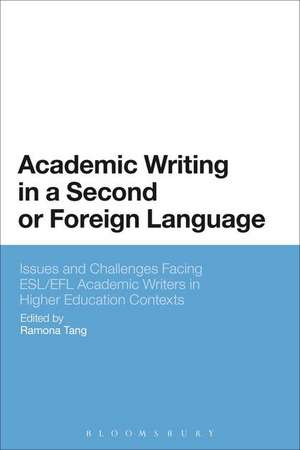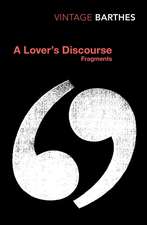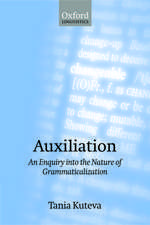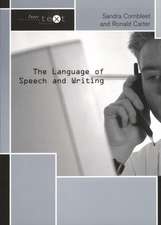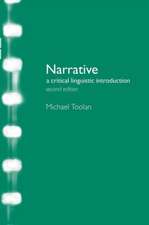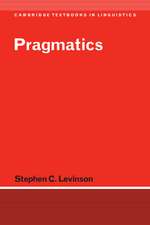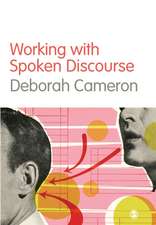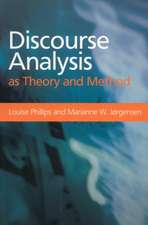Academic Writing in a Second or Foreign Language: Issues and Challenges Facing ESL/EFL Academic Writers in Higher Education Contexts
Editat de Ramona Tangen Limba Engleză Paperback – 6 noi 2013
| Toate formatele și edițiile | Preț | Express |
|---|---|---|
| Paperback (1) | 257.97 lei 43-57 zile | |
| Bloomsbury Publishing – 6 noi 2013 | 257.97 lei 43-57 zile | |
| Hardback (1) | 1008.01 lei 43-57 zile | |
| Bloomsbury Publishing – 11 ian 2012 | 1008.01 lei 43-57 zile |
Preț: 257.97 lei
Preț vechi: 295.63 lei
-13% Nou
Puncte Express: 387
Preț estimativ în valută:
49.37€ • 51.41$ • 41.72£
49.37€ • 51.41$ • 41.72£
Carte tipărită la comandă
Livrare economică 10-24 martie
Preluare comenzi: 021 569.72.76
Specificații
ISBN-13: 9781472522665
ISBN-10: 1472522664
Pagini: 272
Dimensiuni: 156 x 234 x 14 mm
Greutate: 0.39 kg
Editura: Bloomsbury Publishing
Colecția Bloomsbury Academic
Locul publicării:London, United Kingdom
ISBN-10: 1472522664
Pagini: 272
Dimensiuni: 156 x 234 x 14 mm
Greutate: 0.39 kg
Editura: Bloomsbury Publishing
Colecția Bloomsbury Academic
Locul publicării:London, United Kingdom
Caracteristici
Examines the various ways students and scholars learn to write for academic purposes.
Notă biografică
Ramona Tang is Assistant Professor at the National Institute of Education, Singapore.
Cuprins
Acknowledgements Contributors Chapter 1. Introduction: The Issues and Challenges Facing Academic Writers from ESL / EFL Contexts: An Overrview, Ramona Tang Part I: Learning to Write for Academic Purposes Chapter 2. Identifying and Addressing Challenges to International Publication Success for EFL Science Researchers: Implementing an integrated training package in China, Margaret Cargill & Patrick O'Connor Chapter 3. Text and Corpus Work, EAP Writing, and Language Learners, Giuliana Diani Chapter 4. The Impact of Experience and Beliefs on Chinese EFL Student Writers' Feedback Preferences, Guangwei Hu & Hongwei Ren Chapter 5. Thesis and Dissertation Writing: Moving beyond the text, Brian Paltridge & Lindy Woodrow Part II: Features of ESL/EFL Learner Discourses Chapter 6. The Challenges of Writing a Successful Thesis Conclusion, Jo Lewkowicz Chapter 7. EFL / ESL Writers and the Use of Shell Nouns, Hilary Nesi & Emma Moreton Chapter 8. Writing in Tables and Lists: A study of Chinese students' undergraduate assignments in UK universities, Maria Leedham Part III: Identity Work and Professional Opportunities in Academic Writing Chapter 9. Writing and Researching Between and Beyond the Labels, Hanako Okada & Christine Pearson Casanave Chapter 10. Identity Without the 'I': A study of citation sequences and writer identity in literature review sections of dissertations, Suganthi John Chapter 11. Two Sides of the Same Coin: Challenges and opportunities for scholars from ESL / EFL backgrounds, Ramona Tang Afterword, English Medium Writing for Academic Purposes: foundational Categories, Certainty and Contingency Theresa Lillis Index
Recenzii
This collection is both thought-provoking and motivating for the teacher, as well as researcher ... The book would be relevant to applied linguists, academic writing teachers and their postgraduate students. Recommended.
Welcome in its honesty and attempt at balancing out what is gained and what is lost by our having one language at present that is privileged over others.
This book consists of an eclectic selection of issues in academic writing relevant to ESL/EFL background scholars and their teachers. The book's contributors, from many countries, offer perspectives on writers from a range of Asian and European backgrounds, at a range of professional levels, and from a range of writing contexts... The book provides a valuable contribution to those areas of applied linguistics concerned with issues of academic writing, with issues faced by users of English as an additional language, and with some ways in which academic English discourse norms can be made more transparent. While the book will be of particular interest to anyone involved in supporting the academic work of ESL/EFL writers, it also offers, in several chapters, valuable and practical information for writers of any background, English L1 included, who want greater insight into specific academic English discursive norms... The afterword adds a refreshingly provocative overview of some major issues of concern for those interested in some of the broader philosophical issues and assumptions.
highly interesting for academics engaged in research on the real world academic practices of academics and PhD students who want to make justified choices in relation to their careers, but also for the wider academic community, the administrators, and the policymakers who strive for a more equitable and just system that enables knowledge exchange and accessibility among individuals and communities located in different parts of the world.
This finely-edited and timely collection represents a splendid analysis of issues and challenges facing ESL/EFL academic writers at textual and sociocultural levels. It achieves this by profiling wide-ranging geographical and learning contexts and presenting a kaleidoscope of research topics and approaches. Without doubt, the book will remain a landmark anthology and a standard citation in research on ESL/EFL academic writing in years to come.
Ramona Tang has assembled a collection of chapters that brings together a wealth of practical knowledge and experience of teaching and researching academic writing, together with insightful discussion of the position of and practices that surround English in higher education and academia more generally. This book captures the breadth of current thinking around academic writing and will be invaluable for practitioners and researchers.
Overall, this collection has brought to the fore a wide range of topics under the theme of 'academic writing in a second or foreign language' for the sake of both scholars under pressure to publish in the medium of English (Lillis, 2006) and tertiary-level students from non-English-speaking backgrounds facing L2 writing difficulties (Kroll, 2003). Diverse in research topics, sites, participants, methodologies and approaches, this volume should prove to be of great use to academic writers, especially non-native English students and scholars, and can provide insightful teaching implications for EAP instructors as well. - Nana Xu is a graduate student majoring in second language acquisition in the English language department at Nankai University. Her research interests focus on classroom reticence and self-regulated language learning.
This collection is both thought-provoking and motivating for the teacher, as well as researcher. It reflects the wide-ranging nature of the study of academic writing, indicating future thinking, including closer links with writing in the profesions. The book would be relevant to applied linguists, academic writing teachers and their postgraduate students.
This is an interesting and innovative collection ... from leading contributors in their fields ... [It] is both thought-provoking and motivating for the teacher, as well as the researcher.
Welcome in its honesty and attempt at balancing out what is gained and what is lost by our having one language at present that is privileged over others.
This book consists of an eclectic selection of issues in academic writing relevant to ESL/EFL background scholars and their teachers. The book's contributors, from many countries, offer perspectives on writers from a range of Asian and European backgrounds, at a range of professional levels, and from a range of writing contexts... The book provides a valuable contribution to those areas of applied linguistics concerned with issues of academic writing, with issues faced by users of English as an additional language, and with some ways in which academic English discourse norms can be made more transparent. While the book will be of particular interest to anyone involved in supporting the academic work of ESL/EFL writers, it also offers, in several chapters, valuable and practical information for writers of any background, English L1 included, who want greater insight into specific academic English discursive norms... The afterword adds a refreshingly provocative overview of some major issues of concern for those interested in some of the broader philosophical issues and assumptions.
highly interesting for academics engaged in research on the real world academic practices of academics and PhD students who want to make justified choices in relation to their careers, but also for the wider academic community, the administrators, and the policymakers who strive for a more equitable and just system that enables knowledge exchange and accessibility among individuals and communities located in different parts of the world.
This finely-edited and timely collection represents a splendid analysis of issues and challenges facing ESL/EFL academic writers at textual and sociocultural levels. It achieves this by profiling wide-ranging geographical and learning contexts and presenting a kaleidoscope of research topics and approaches. Without doubt, the book will remain a landmark anthology and a standard citation in research on ESL/EFL academic writing in years to come.
Ramona Tang has assembled a collection of chapters that brings together a wealth of practical knowledge and experience of teaching and researching academic writing, together with insightful discussion of the position of and practices that surround English in higher education and academia more generally. This book captures the breadth of current thinking around academic writing and will be invaluable for practitioners and researchers.
Overall, this collection has brought to the fore a wide range of topics under the theme of 'academic writing in a second or foreign language' for the sake of both scholars under pressure to publish in the medium of English (Lillis, 2006) and tertiary-level students from non-English-speaking backgrounds facing L2 writing difficulties (Kroll, 2003). Diverse in research topics, sites, participants, methodologies and approaches, this volume should prove to be of great use to academic writers, especially non-native English students and scholars, and can provide insightful teaching implications for EAP instructors as well. - Nana Xu is a graduate student majoring in second language acquisition in the English language department at Nankai University. Her research interests focus on classroom reticence and self-regulated language learning.
This collection is both thought-provoking and motivating for the teacher, as well as researcher. It reflects the wide-ranging nature of the study of academic writing, indicating future thinking, including closer links with writing in the profesions. The book would be relevant to applied linguists, academic writing teachers and their postgraduate students.
This is an interesting and innovative collection ... from leading contributors in their fields ... [It] is both thought-provoking and motivating for the teacher, as well as the researcher.
